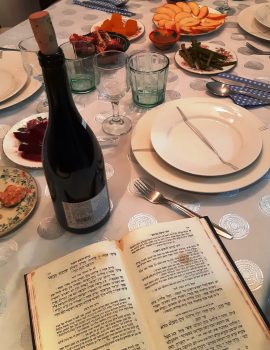Hebrew Useful Phrases for the Jewish Holidays Posted by Ayana on Sep 23, 2019 in Uncategorized
The first month in the Hebrew calendar is always busy.
Tishrei, the first month in the Hebrew calendar, is full of festivals. Four holidays are observed in less than one month. The first day of the month is the first day of the year, in which we celebrate the New Year. Ten days later is Yom Kippur. Sukkot is celebrated on the 15th day of Tishrei. Simchat Torah follows immediately after the festival of Sukkot. All of this is laid out in the chart below:

Tishrei’s holiday season is called in Hebrew הַחַגִּים, and literally means the holidays. New Year, one of the most important Jewish festivals, is the first חַג (holiday) to be celebrated during this season which ends with Simchat Torah. This year, the Jewish New Year Eve is celebrated on September 29th, Simchat Torah is celebrated less than a month after – on October 21st.
Here are 5 useful phrases for the Jewish holidays:
חַג שָׂמֵחַ
חַג is a noun meaning holiday,or festival. שָׂמֵחַ is an adjective meaning happy, joyful. Together it is translated to happy holiday, a common greeting in Israel during Tishrei. The greeting refers to any holiday. When mentioning a specific holiday the name of the holiday appears between the wordsחַג and שָׂמֵחַ. For example: חַג סֻכּוֹת שָׂמֵחַ.
שָׁנָה טוֹבָה
שָׁנָה טוֹבָה is another common greeting during Tshrei. It means Happy New Year, and it’s mainly used around Rosh Hashanah, the Jewish New Year, but you can hear it often during the whole month.
לְרֶגֶל הַחַג
לְרֶגֶל is a preposition, meaning for, in honor of. The phrase לְרֶגֶל הַחַג indicates anything that is done intentionally for the holiday: a special sale in the store, a holiday issue of a magazine, a greeting from the country leaders, a new clothing bought for the holiday, different opening hours of a business, and so on. For example:
- לׅידִיעָתְכֶם, הַחֲנוּת תִּהֲיֶה סְגוּרָה לְרֶגֶל הַחַג מׅיּוֺם רׅאשׁוֺן וְעַד יוֺם רְבׅיעׅי.
Please note that the store will be closed for the holiday from Sunday to Wednesday.
- עִירִיַּית תֵּל אָבִיב מְחַלֶּקֶת מָזוֺן לְנׅזְקָקׅים לְרֶגֶל הַחַג.
Tel Aviv Municipality distributes food for those in need on holiday.
- לְרֶגֶל הַחַג, הַכְּנׅיסָה לַמּוֺזֵיאוֺן חׅינָם.
For the holiday, admission to the museum is free.
אֵיפֹה אַתֶּם בַּחַג?
Jewish families used to gather together during the holidays. Holidays’ eves are usually celebrated in a big family dinner, every festival with its special rituals and traditional food. The next days are also spent together. Israeli families take advantage of these days off to hike, travel, picnic or simply visit relatives and friends. אֵיפֹה אַתֶּם בַּחַג? (Where are you celebrating?) is a popular question in Israel preceding every holiday. Israeli relatives, friends and neighbors will surely ask you about your plans for the coming holiday, but even store clerks, supermarket cashiers and newspaper delivery men will be interested. Israelis are very warm people, and with this short question they show interest in you, chat a bit and extend holiday greetings
For advanced Hebrew reading check up those articles in which local politicians and celebrities answer the festive question: אֵיפֹה אַתֶּם בַּחַג?.
אַחֲרֵי הַחַגִּים
The hectic Tishrei month is full of days off from school and work. Rosh Hashanah, Yom Kippur, the first day of Sukkot, and Simchat Torah are days off for all. Many places also give their workers vacation during the holidays’ eves, and for the rest of Sukkot. The day after Simchat Torah is a day off in the Israeli educational system. This bunch of days off created the expression: אַחֲרֵי הַחַגִּים, which literally means after the holidays. The common phrase refers to the period after Tishrei’s festivals, when things get back on track, people get back to their work and daily duties, and everything works according to a regular schedule. For example:
- אַחֲרֵי הַחַגִּים אֲנִי אֶיצוֹר אִיתְּךָ קֶשֶׁר וְנִקְבָּע פְּגִישָׁה.
I’ll contact you after the holidays and we’ll set a meeting.
- אֲנַחְנוּ מַעְדִיפִים לְטַיֵּיל אַחֲרֵי הַחַגִּים, כְּשֶׁכּוּלָּם חוֹזְרִים לַעֲבוֹדָה וְאַתְרֵי הַּתַּיָּירוּת מׅתְרוֺקְנׅים מְטַיְּילִים.
We prefer to travel after the holidays, when everyone returns back to work and the tourist sites become empty.
The phrase is no longer used only literally, and became over the years an expression of procrastination, sometimes even eternal procrastination. An opinion article from an Israeli newspaper describes it well:
הֲכִי טוֹב לִדְחוֹת לְאַחַר-כָּךְ מָה שֶׁאֵין כּוֹחַ לַעֲשׂוֹת עַכְשָׁיו, וְלִהְיוֹת יוֹתֵר טוֹבִים מָחָר, כִּי הַיּוֹם הִתְעַיַּיפְנוּ… נַתְחׅיל דִּיאֶטָה, נׅירָשֵׁם לׅקְבוּצַת רִיצָה, נְסַדֵּר אֶת הָאָרוֹן, נְסַיֵּים אֶת הַתֶּזָה, נֵצֵא עׅם בֶּן הַזּוּג לְדֵּיְיט שְׁבוּעִי, נַשְׁקׅיעַ בְּשִׁעוּרֵי בַּיִת שֶׁל הַיְּלָדׅים, נְבַקֵּשׁ הַעֲלָאָה, נַעֲבוֹר בַּנְק, נְנַסֶּה לְהָבִין מָה זֶה בִּטּוּחַ חַיִּים, נַעֲמוֹד עַל הַזְּכוּיּוֹת שֶׁלָּנוּ… וְאׅם לֺא אַחֲרֵי הַחַגִּים הָאֵלֶּה, אָז אַחֲרֵי הַחַגִּים שֶׁל הַשָׁנָה הַבָּאָה.
It is best to postpone for later what we don’t have the energy to do now. We’ll become better tomorrow, because today we are already tired … We’ll start a diet, sign up for a running group, rearrange the closet, finish the thesis, take the partner for a weekly date, help the children with their homework, ask for a raise, move to another bank, try to figure out what life insurance is, stand up for our rights … and if not after these holidays, then after the next year’s holidays.
Keep Calm and Learn Hebrew!

Build vocabulary, practice pronunciation, and more with Transparent Language Online. Available anytime, anywhere, on any device.




